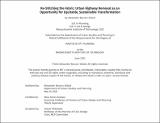| dc.description.abstract | The detrimental effects of a century of highway construction and use in U.S. cities are clear. From polluting the air, contributing to climate change, encouraging urban sprawl, and entrenching racial and economic injustice in the built environment, urban highways urgently need reimagining as we aim to build a more just and sustainable society. As a result, cities across the country have slowly begun to remove their highways and undo past harms by reclaiming public space, promoting sustainable modes of transportation, and redeveloping newly available land. While past removal projects have undoubtedly improved their urban public realms, they have often missed opportunities to encourage sustainable mode shift and resist community displacement. Given recent calls for highway removal by communities, local leaders, and the federal government, now is the time to ensure the benefits of these projects are shared by all.
This thesis aims to outline a justice-oriented framework which can encourage more holistic highway removal processes. It first uses a case study approach to evaluate past projects through the lenses of sustainable mobility, public realm, and anti-displacement. Through analyses of the removal of part of the Central Freeway in San Francisco, CA and the Cypress Freeway in Oakland, CA, it identifies best practices to adopt and failures to avoid. It then specifies a set of analytical and procedural dimensions necessary for ensuring more equitable and sustainable outcomes. Finally, this framework is illustrated and tested using a proposed highway removal project: the rest of San Francisco’s Central Freeway. | |
